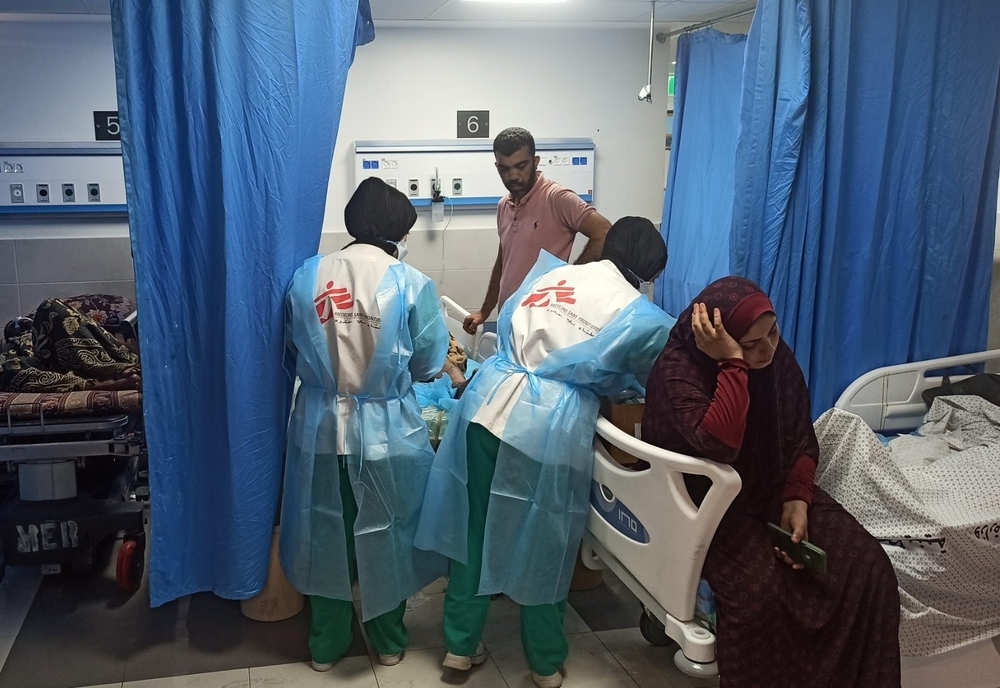Doctors Without Borders/Médecins Sans Frontières (MSF) has been working in Palestine before and throughout the current war, providing desperately needed medical care and assistance in a fast-changing, politically charged setting. Here are some of the questions frequently asked about our work as it pertains to the ongoing crisis.
Why is MSF speaking out about the conflict in Gaza?
One of the central pillars of our identity is to bear witness and call attention to the problems driving emergency needs in the places where we provide humanitarian assistance.
We have a long history of speaking out and advocacy when governments or other actors implement policies that threaten the health and safety of our patients or our staff, for example in conflicts in Syria, Yemen, and Afghanistan.
International humanitarian law and the rules of war require militaries to distinguish between civilians and combatants and prohibit attacks that cause disproportionate harm to civilians and civilian objects. The way Israel is prosecuting this war is causing massive death and suffering among Palestinian civilians and is inconsistent with these norms and laws.
Medical facilities and their surrounding areas have repeatedly been attacked or subjected to evacuation orders by Israeli forces, making access to healthcare extremely dangerous for patients and putting the lives of medical staff at risk. This compels us to speak out and demand an immediate ceasefire.
Why are your statements so critical of Israel? Why are you not talking about Hamas?
As humanitarians, we grieve for all civilian lives lost, and the vast majority of the victims of this conflict are civilians, including many elderly people, women and children. Violence against civilians is never justified, and all civilians deserve protection.
MSF’s reporting is based on what our patients and staff tell us they are seeing on the ground in Gaza, where the Israeli military campaign and siege have had devastating consequences. The healthcare system has collapsed, and hospitals have run out of drugs, medical supplies, and fuel for generators. People have limited access to food, water, shelter, and electricity. And the death toll continues to rise.
Why is MSF calling for a ceasefire? Aren’t you a non-partisan organization?
We are calling for a sustained ceasefire because widespread and indiscriminate attacks on civilians—including attacks on healthcare—have made it impossible to deliver the humanitarian assistance needed in Gaza.
MSF offers medical humanitarian assistance to people based solely on need, irrespective of race, religion, gender, or political affiliation. As an organization, we focus on filling the greatest gaps in healthcare.
We have no agenda except to go where we are needed and treat patients and we are struggling to do so right now in Gaza due to the lack of drugs, medical supplies and fuel for generators.
How does MSF respond to critiques that it is anti-Israel or anti-Semitic?
MSF takes any allegation of anti-Semitism extremely seriously. At any given time, MSF has approximately 68,000 people working in our projects and headquarters. Any form of bigotry or discrimination by MSF staff is unacceptable.
We do not believe that criticism of Israeli government policies is equivalent to anti-Semitism.
MSF speaks out when governments or actors implement policies that are harmful to the health and safety of our patients or our staff. The way Israel is prosecuting this war is causing massive death and suffering among Palestinian civilians and putting our staff at risk. This is inconsistent with the norms and laws of war.
No state is above criticism.
As humanitarians, we grieve for all civilian lives lost, and the vast majority of the victims of this conflict are civilians, including many elderly people, women, and children. Violence against civilians is never justified, and all civilians deserve protection.
What is MSF’s relationship with Hamas in Gaza?
MSF works with the Ministry of Health in Gaza. We coordinate our work through them. When it comes to ensuring the safety of our teams in Gaza, we maintain contact with the Ministry of Interior in Gaza, just as we maintain contact with the Israeli authorities. MSF works in more than 70 countries around the world. Wherever armed conflict is present, we maintain contact with all actors to safeguard our teams and activities.
